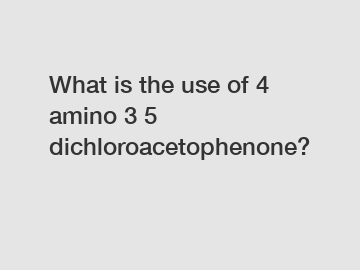What is the use of 4 amino 3 5 dichloroacetophenone?
What is the use of 4 amino 3 5 dichloroacetophenone? This compound, also known as DCPA, is commonly used as a herbicide to control weeds in a variety of crops. It works by inhibiting the growth of unwanted plants and is particularly effective against grassy weeds.
DCPA was first synthesized in the 1940s and has since become a key tool in agricultural weed control. Its mode of action involves inhibiting an enzyme involved in the synthesis of carotenoids, which are essential for plant growth and development. Without carotenoids, the weeds are unable to survive and eventually die off.
The efficacy of DCPA as a herbicide has been well studied and documented. Field trials have shown that it can effectively control a wide range of grassy weeds in various crops, including corn, soybeans, and cotton. Its selective action against weeds makes it an ideal choice for use in crops where broadleaf herbicides would cause damage to desired plants.

In addition to its effectiveness, DCPA is also known for its low environmental impact. It has a low toxicity to humans and non-target organisms, as well as a short half-life in the environment. This means that it breaks down quickly and does not persist in the soil or water, reducing the risk of harmful effects on ecosystems.
Overall, the use of 4 amino 3 5 dichloroacetophenone as a herbicide offers farmers a safe and effective way to control weeds in their crops. Its selective action, low environmental impact, and proven efficacy make it a valuable tool in modern agriculture. By understanding the importance of this compound and incorporating it into weed control strategies, farmers can improve crop yields and minimize the use of more harmful chemical pesticides.
For more CAS 2079878-75-2 2F, 2-iodo-1-p-tolylpropan-1-one 236117-38-7 supply, Wuhan Lwaxinformation, please contact us. We will provide professional answers.
207
0
0

Comments
All Comments (0)